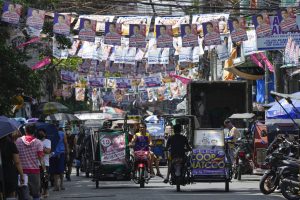This month’s presidential elections in the Philippines fell far short of “free and fair” due to rampant vote-buying, politically-motivated violence, and serious shortcomings in the electoral process, according to a group of international election monitors.
In an interim report released yesterday, the International Observer Mission (IOM), which was sponsored by the International Coalition for Human Rights in the Philippines, found that the May 9 polls, “took place in the most repressive atmosphere seen since the time of dictator Ferdinand Marcos” – not coincidentally, the father of this year’s winning candidate, Ferdinand Marcos Jr.
Among these were unprecedented failures in the country’s electronic voting system and problems with the voter lists that saw many voters unable to cast a ballot. The IOM also noted “a higher level of blatant vote-buying, disturbing level of ‘red-tagging’” – in which opposition members are publicly accused of ties to communist insurgents – “and a number of incidents of deadly violence.”
“These elections are extremely important to both the international community and the Filipino people,” IOM Commissioner and Belgian parliamentarian Séverine De Laveleye said in a press release accompanying the report’s release, “but sadly the outcome suggests a continued drift towards repression, state impunity, and state terror.”
The IOM’s claims represent a narrative deeply at odds with the triumphant narrative of the campaign of Ferdinand Marcos Jr., which according to provisional election data from the Commission on Elections, or Comelec, won with 31.1 million votes, more than double the 14.8 million won by his main challenger, Vice President Leni Robredo. Marcos’ vice presidential running-mate Sara Duterte-Carpio, the mayor of Davao City in the southern Philippines and the daughter of the current president, Rodrigo Duterte, won by a similarly decisive margin.
The IOM report, based on observations of the campaign and vote in Central Luzon, Southern Luzon, Central Visayas, Western Visayas, and Mindanao, as well as the capital Manila, documents a campaign of intimidation during the three-month campaign period. This included instances of “political killings, shootings, abductions, death threats, political arrests, harassment and surveillance of candidates and supporters, very large-scale red tagging, widespread vote-buying, media manipulation and repression, fake news and harassment of journalists by the Marcos campaign.”
The IOM connects these to the six-year term of outgoing President Duterte, which has been marked by a bloody “war on drugs” that has claimed many thousands of victims, as well as politically motivated arrests, such as that of Senator Leila de Lima. Under Duterte, the authors of the report argue, “the entire machinery of the state, including the judiciary, the military and police, the departments of education, social services and local government, has been marshaled for this war on dissent.”
“Given that the Marcos-Duterte UniTeam praised the notorious policies of the current President Duterte,” the report concludes, “the international community needs to increase its focus on the human rights situation in the Philippines because it will only worsen from here.”
Whether the allegations would have changed the eventual winner is unclear, given the massive margin of victory that Marcos and Duterte managed to achieve. But it hints at the extent to which the Philippines’ democracy, which has always been distorted by wealth and power of provincial political dynasties and widespread corruption, has deteriorated during Duterte’s six years in office.

































